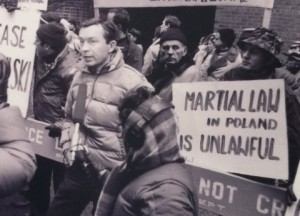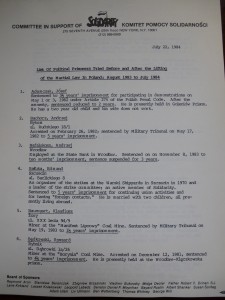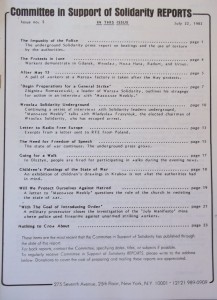
Committee in Support of Solidarity founder Jakub Karpinski leading one of its demonstrations in New York City.

Nobel Prize laureate and poet, Joseph Brodsky in New York, with a copy of the Solidarnosc Bulletin (1982).

A list of political prisoners in Poland, July 1983-July 1984, showing the extent of repression after martial law was supposedly “lifted.”
The Committee in Support of Solidarity
The Committee in Support of Solidarity, some of whose members later created the Institute for Democracy in Eastern Europe, was formed on December 13, 1981 to aid Poland’s Solidarność trade union and the broad freedom movement for freedom it represented following the imposition of martial law by the communist regime of General Wojciech Jaruzelski. Based in New York, it was one of the most comprehensive information, assistance, human rights, and international solidarity campaigns in NGO history.
The Committee was formed by Americans and Poles in the United States who had organized support for the Solidarity movement after its dramatic rise in August 1980 as the first independent trade union to be recognized in a Soviet bloc communist country. They were joined by several Solidarity and Polish opposition representatives in the US at the time martial law was imposed. The Committee organized major demonstrations and other public support for Solidarity; it gathered and disseminated information in English and Polish on human rights violations to the public, the US government, and various organizations and international institutions; it raised funds for Solidarity and other opposition groups and underground initiatives; and it assisted many organizations and foundations in their efforts to provide assistance to Solidarnosc in its underground struggle against the harsh repression of the Jaruzelski regime.
The Committee’s press reports, the Solidarność Bulletin, and the Committee in Support of Solidarity Reports (50 issues) provided immediate, ongoing, and thorough information on the widespread repression suffered by the Polish people and on the determined struggle of underground Solidarity against the communist regime to regain basic trade union and other freedoms. (Initially, the four issues of the Solidarność Bulletin are available in digital format in the Archives section.) The Committee also issued briefings, comprehensive lists of political prisoners, its own human rights reports, and the reports of the Helsinki Committee in Poland. These were presented to UN agencies, international human rights organizations, and Western governments as part of an active and successful lobbying campaign of US and Western governments and international institutions, such as the International Labor Organization and the U.N. Council on Human Rights, to condemn the human and worker rights violations of the communist regime. The Committee’s publications, human rights reports, and public advocacy documents (now available at the Hoover Institution Archives of Stanford University) remain among the most comprehensive sources of information on the martial law period and the struggle of underground Solidarity in Poland (1981-89).
In addition to lobbying international human rights bodies, the Committee lobbied the US government and Congress to maintain strong policies to maintain pressure on the Polish communist government to end repression, respect human rights, and re-legalize Solidarity. It worked closely with the AFL–CIO in its moral, political, and financial support campaigns, especially in lobbying US institutions regarding US policy towards Poland; in domestic and international solidarity campaigns; and in raising funds and getting material and financial assistance to the underground structures of the independent trade union and other underground initiatives linked to the Solidarity movement
Starting in early 1982, the Committee organized public events and carried out other fundraising campaigns to raise money and gather material assistance for underground Solidarity in Poland. It provided some of the earliest support to underground trade union structures as well as for affiliated initiatives in the fields of education, culture, and science. It also provided ongoing support for the Consortium of Independent Publishers, which allowed support to flow to dozens of underground publishers printing books and journals not allowed under the regime’s censorship. The Committee also coordinated a campaign among American trade unions on behalf of Solidarity’s Lawfulness Commission to provide material and financial assistance to several hundred families of political prisoners as well as a stipend program for several hundred Polish students to travel and study in the West. Overall, the Committee provided support to more than 1,000 independent trade union structures, publications, book publishers, and human rights initiatives.
In 1985, Eric Chenoweth and Irena Lasota, the Committee’s director and president, as well as board members Jakub Karpiński and Tom Kahn of the AFL-CIO, among others, formed the Institute for Democracy in Eastern Europe with the aim of assisting the growing opposition and dissident movements in the communist regimes of Eastern Europe, the Soviet Union, and Yugoslavia. The Committee in Support of Solidarity, however, continued as a vehicle for organizing direct support to the Solidarity movement through the collapse of the communist regime in 1989. In addition to supporting key underground trade union structures that sparked the reemergence of the Solidarity trade union in the 1988 strikes, IDEE also helped Zbigniew and Zofia Romaszewski organize the International Human Rights Conference of in Krakow, Poland in 1988.
The archives of the Committee in Support of Solidarity are deposited at the Hoover Institution Archives at Stanford University.

